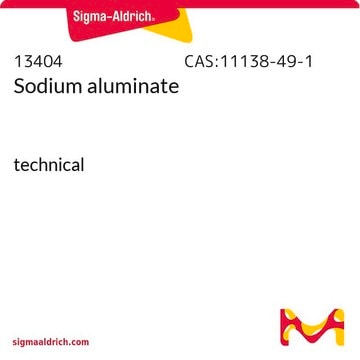420808
LUDOX® LS colloidal silica
30 wt. % suspension in H2O
Synonym(s):
Silica preparation
Sign Into View Organizational & Contract Pricing
All Photos(1)
About This Item
Linear Formula:
SiO2
CAS Number:
Molecular Weight:
60.08
MDL number:
UNSPSC Code:
12352309
PubChem Substance ID:
NACRES:
NA.22
Recommended Products
description
colloidal
Quality Level
form
viscous liquid
concentration
30 wt. % suspension in H2O
surface area
~215 m2/g
pH
8.2
density
1.21 g/mL at 25 °C
SMILES string
O=[Si]=O
InChI
1S/O2Si/c1-3-2
InChI key
VYPSYNLAJGMNEJ-UHFFFAOYSA-N
Looking for similar products? Visit Product Comparison Guide
Application
sodium stabilizing counterion
Legal Information
LUDOX is a registered trademark of W.R. Grace & Co.-Conn.
LUDOX is a registered trademark of W.R. Grace & Co.-Conn.
Signal Word
Warning
Hazard Statements
Precautionary Statements
Hazard Classifications
Aquatic Chronic 3 - Skin Sens. 1
Storage Class Code
12 - Non Combustible Liquids
WGK
WGK 2
Flash Point(F)
Not applicable
Flash Point(C)
Not applicable
Personal Protective Equipment
dust mask type N95 (US), Eyeshields, Gloves
Choose from one of the most recent versions:
Already Own This Product?
Find documentation for the products that you have recently purchased in the Document Library.
Customers Also Viewed
David M Brown et al.
Toxicology letters, 224(1), 147-156 (2014-01-28)
We investigated the effects of silica particles and nanoparticles (NPs) (50 nm and 200 nm) with a neutral and positively charged surface when dispersed in saline, bovine serum albumin (BSA) or lung lining fluid (LLF) 24 h post instillation into
Richard Hayes et al.
Journal of chromatography. A, 1357, 36-52 (2014-05-27)
The challenges in HPLC are fast and efficient separation for a wide range of samples. Fast separation often results in very high operating pressure, which places a huge burden on HPLC instrumentation. In recent years, core-shell silica microspheres (with a
Fabrice Gritti et al.
Journal of chromatography. A, 1342, 24-29 (2014-04-17)
The advantages of using columns packed with stationary phases having a composition gradient so that retention factors increase toward the outlet and eluting them with an isocratic mobile phase may provide increased peak resolution in liquid chromatography. This approach is
Alexandra I Lupulescu et al.
Science (New York, N.Y.), 344(6185), 729-732 (2014-05-17)
The growth mechanism of silicalite-1 (MFI zeolite) is juxtaposed between classical models that postulate silica molecules as primary growth units and nonclassical pathways based on the aggregation of metastable silica nanoparticle precursors. Although experimental evidence gathered over the past two
Xiaoxiao He et al.
Journal of biomedical nanotechnology, 10(7), 1359-1368 (2014-05-09)
This paper describes a sensitive and specific determination strategy for Staphylococcus aureus (S. aureus) detection using aptamer recognition and fluorescent silica nanoparticles (FSiNPs) label based dual-color flow cytometry assay (Aptamer/FSiNPs-DCFCM). In the protocol, an aptamer, having high affinity to S.
Our team of scientists has experience in all areas of research including Life Science, Material Science, Chemical Synthesis, Chromatography, Analytical and many others.
Contact Technical Service





